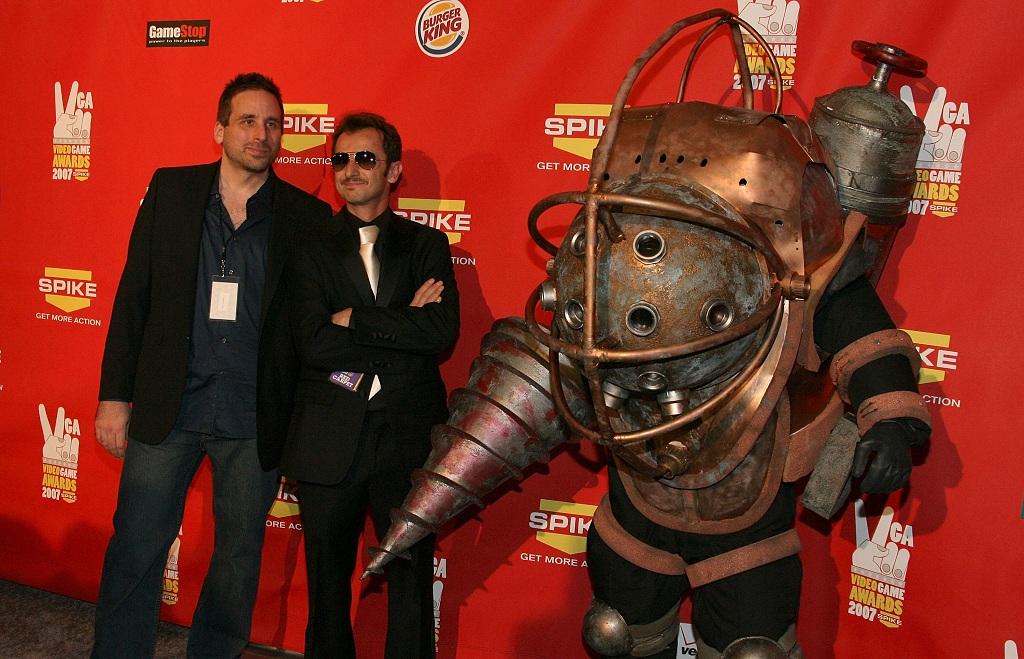Bioshock Infinite: A video game that takes on US politics
Bioshock Creative Directors Ken Levine (L) and Greg Gobbi (C) pose with the ‘Bioshock’ character at Spike TV’s 2007 ‘Video Game Awards’ at the Mandalay Bay Events Center on December 7, 2007 in Las Vegas, Nevada.
Just as gamers were getting a grip on the near farcical amount of incredible titles released last year, 2012 is shaping up to be one of the most exciting years in gaming. At the top of this year's most anticipated games sits Diablo III, Blizzard's next installment in the beloved Diablo franchise that has been 12 years in the making.
Other titles set to launch in 2012, like Counter-Strike: Global Offensive, Starcraft II: Heart of the Swarm, Halo 4, Borderlands 2, and Mass Effect 3 are, simply put, some of the most highly-anticipated releases of the last two decades. In the case of Counter-Strike: GO and Starcraft II: Heart of the Swarm, these games will be played in international tournaments, from Seoul to Helsinki, for millions of dollars in prize money.
Yet during this election year in the United States, one release may pique the interest of politicians, voters, and gamers alike.
BioShock Infinite, the third installment of the controversial first-person shooter franchise developed by Irrational Games is a title that values its politically relevant narrative just as much as gameplay mechanics.
In the game, you play former Pinkerton agent Brooke DeWitt in the reimagined world of 1912, floating on an enormous airship named “Columbia,” a reference to the female personification of the young United States, used in early American poetry and literature.
In the first moments of the trailer, Agent DeWitt awakens, groggy and disoriented, staring directly into a mural of Georgia Washington. Consumed by holy yellow light, General Washington, America's first president, brandishes the Liberty Bell and the Ten Commandments.
As the camera begins to zoom out, bringing Washington into focus, the player is introduced to the plot for the first time. Washington is standing on a banner, flanked by American flags.
“It is our holy duty to guard against the foreign hordes,” it reads.
Further scrutiny of the image reveals caricatured depictions of immigrants from all parts of America’s history including Latinos, Irishmen, Eastern Europeans and Asians, cowering before the holy patriotism of General Washington.
The satire is neither subtle nor easy to stomach.
More from GlobalPost: Can video games cure cancer?
Combined with elements of absurdist fantasy, the opening moments of the game shown in a trailer continue, perhaps shamelessly, to lay the Tea Party corollaries on as thickly as possible. The game itself functions as a reductio ad absurdum argument against what developers apparently deem to be xenophobic trends in America’s current political dialogue.
The right wing rulers of Columbia, known as the “Founders,” go on to wage a war against the Vox Populi, Latin for “voice of the people.” The Vox Populi are an insurgent group loosely based on Germany’s Red Army Faction and also inspired by Occupy Wall Street, according to Irrational Games’ creative developer, Ken Levine, in an interview with the Washington Post last October.
“I’ve been spending a lot of time watching Occupy Wall Street. The complaint is that they don’t have a consistent message. You can watch that, and this is a challenge I’ve had writing [the Vox Populi]. Leftist movements are always less organized … so Occupy Wall Street has been helping me because I’ve been struggling to figure out how the Vox Populi get to that point in the [game],” Levine said at the time.
BioShock developers are not new to crafting allegorical tales in this interactive medium. The first two games of the franchise, BioShock and BioShock 2, take place in an underwater city called “Rapture,” originally crafted as a utopian society valuing, above all else, personal ambition. The founder of Rapture, Andrew Ryan, bears striking resemblance to John Galt, novelist Ayn Rand’s embodiment of her objectivist philosophy in Atlas Shrugged. Serving as a counterpoint to mid-20th century notions of socialism and a collective good, both Galt and Ryan embody the power of the human intellect and the supposed virtue of self-interest.
However, in an obvious critique of Objectivism, BioShock drops the player into the middle of a dystopian Rapture where ambition has not only led to economic collapse but also to chaos and madness. In the dystopian world, crazed and disfigured citizens of Rapture wander the city hoping to kill others in order to harvest their ADAM, a rare substance discovered by Rapture scientists that modifies a person’s genetic code, granting them super-human powers. Again, the story uses a reductio ad absurdum in arguing against Objectivism.
More from GlobalPost: China and Russia are pushing for greater internet control, via the United Nations
However, in spite of all the critical satire employed in the games’ narrative, Levine stresses that the BioShock series is more about the need for a middle ground or, perhaps more importantly, the dangers of the extreme.
“From where I sit, people think it has to be one or the other and there’s no middle ground. Personally, that tends to scare me … If you look at Occupy Wall Street, it’s opened up dialogue, and you can say the same about the Tea Party. Hopefully, they don’t become extensions of [Republican and Democratic] parties, they will open up the conversation,” Levine said.
In a race for the Republican Party’s presidential nomination where concern over the sexual behavior of two consenting adults is taking center stage over an economy in trouble, perhaps voters who are tired of political polarization will look to gamers to find a little compromise.
And we’ll be there, probably playing BioShock.
